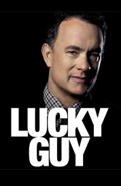George C. Wolfe on Nora Ephron's Strength, Tom Hanks' Smarts & Why Audiences Adore Lucky Guy
About the author:
One of Broadway's most honored and respected directors, George C. Wolfe has won Tonys for his work on plays (both parts of Angels in America) and musicals (Bring In 'Da Noise, Bring In 'Da Funk). Wolfe branched out into films such as Nights in Rodanthe in recent years, but luckily for NYC theatergoers, he returned this season to shepherd the late Nora Ephron's Lucky Guy to Broadway in a production that earned six 2013 Tony nominations, including Best Play, Best Actor (Tom Hanks as tabloid columnist Mike McAlary) and Best Director. In this essay for Broadway.com, the always fascinating and articulate Wolfe shares insight into the development of Lucky Guy and offers warm praise to his collaborators on what has become the season's biggest hit play.
![]()
When I first read Lucky Guy, I was instantly engaged by the language, how testosterone-laced it was. Nora Ephron’s dialogue was smart and irreverent and funny. I also loved that the play involved direct address, characters talking to the audience, swapping and sharing stores as if at a wake. And I loved the fact that it was set in New York of the early/mid-eighties, which was around the time I moved to the city, so it felt very much like "my New York."
When Nora and I began working together in the fall of 2011, the play was called Stories About McAlary. Over the course of our nine-month collaboration, which included a ten day workshop with Tom Hanks, Mike McAlary moved more center-stage in his own story, as opposed to other people’s visions of him—less Stories and more Lucky Guy. Nora and I would talk endlessly about the play. I'd give her tons of notes, and she would come back a week later with a new draft. She was writing with incredible ferocity, which I now understand.
The final draft of Lucky Guy was finished in April, and Nora passed away in June. I found out she was dying the day she died. Initially it was very disturbing and discombobulating, but ultimately I've come to I realize how incredibly generous and elegant her choice was. If I had known she was ill, it would have informed our collaboration. This was how she chose to do it, and ultimately, we have to respect and honor that, and celebrate the strength and focus and bravery it took for her to do what she did.
After Nora’s death, there was never a question, not for one second, as to whether or not we would continue with plans to mount Lucky Guy on Broadway. I'd already started conversations with the designers; we'd already been given a theater by the Shuberts. Although the rehearsal process was challenging because Nora wasn’t in the room, she and I had worked so closely together, and with Tom, that I felt confident I had a very clear understanding of her play and how to stage it.
Was I confident in Tom Hanks making his Broadway debut as Mike McAlary? Without question. First, he has the charm and charisma to make an audience follow him, no matter how complicated the character may be. In addition to being a smart, brilliantly skilled actor, Tom is also a producer. He's developed work, so he knows how to take material and make it better and clearer and sharper. Plus he started out as a stage actor. So working with Tom Hanks is not going out on a limb. Opening a new play directly on Broadway in the era of blogs? That’s a limb!
Tom is part of a dazzling ensemble of brilliant actors, and I believe the best way to build true chemistry on stage is by inviting everybody to join you on the journey, engaging them and challenging them and creating a safe place for them to play and to do their best work, which frequently includes them challenging you back.
The way the play moves, the muscularity and the shape of the evening are unquestionably my vision, but this production, any production that succeeds, does so because everyone in the room gives their best and in doing so, makes the evening breathe and live. That’s what I love about theater—that sense of community and collective discovery.
I’m very proud of my work on Lucky Guy, a play that has a lot of heart and is ridiculously entertaining and ultimately deeply moving. The first 20 minutes of the play feel at times like a football game—the audience cheers stops on the Long Island Railroad! That’s craftsmanship. Writing, acting, directing and design craftsmanship. We’ve all done smart work on what I think is a wonderful play. Nora’s family has been so proud and so supportive.
It’s nice to hear compliments about your work, but I love it even more when people tell me that the work transformed them in some way, or allowed them to release emotions they didn’t know were there. People within the theater community and audience in general have told me, “I felt such a sense of joy watching Lucky Guy,” and that is thrilling to hear. Just thrilling. And very satisfying.
Related Shows
Articles Trending Now
- Death Becomes Her, Maybe Happy Ending, Oh, Mary! and More Earn Nominations for the 2025 Broadway.com Audience Choice Awards
- Maybe Happy Ending Will Be Hitting the Road on a National Tour, Launching Fall 2026
- Ali Louis Bourzgui Reflects on Joining Hadestown, His Upcoming Album and Processing the Experience of Tommy
